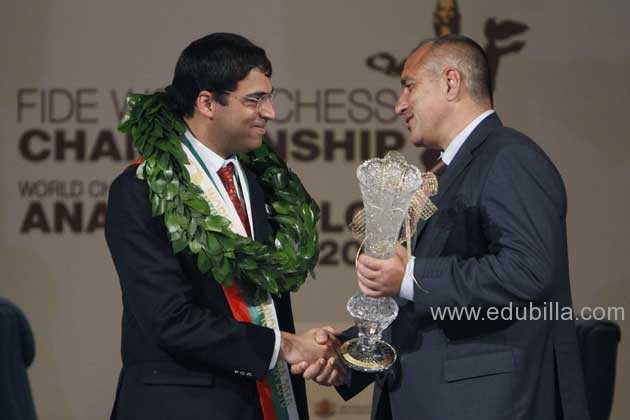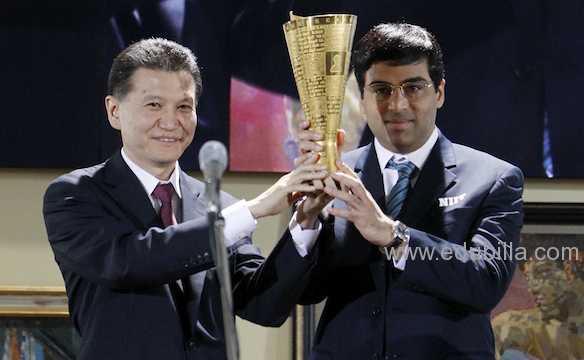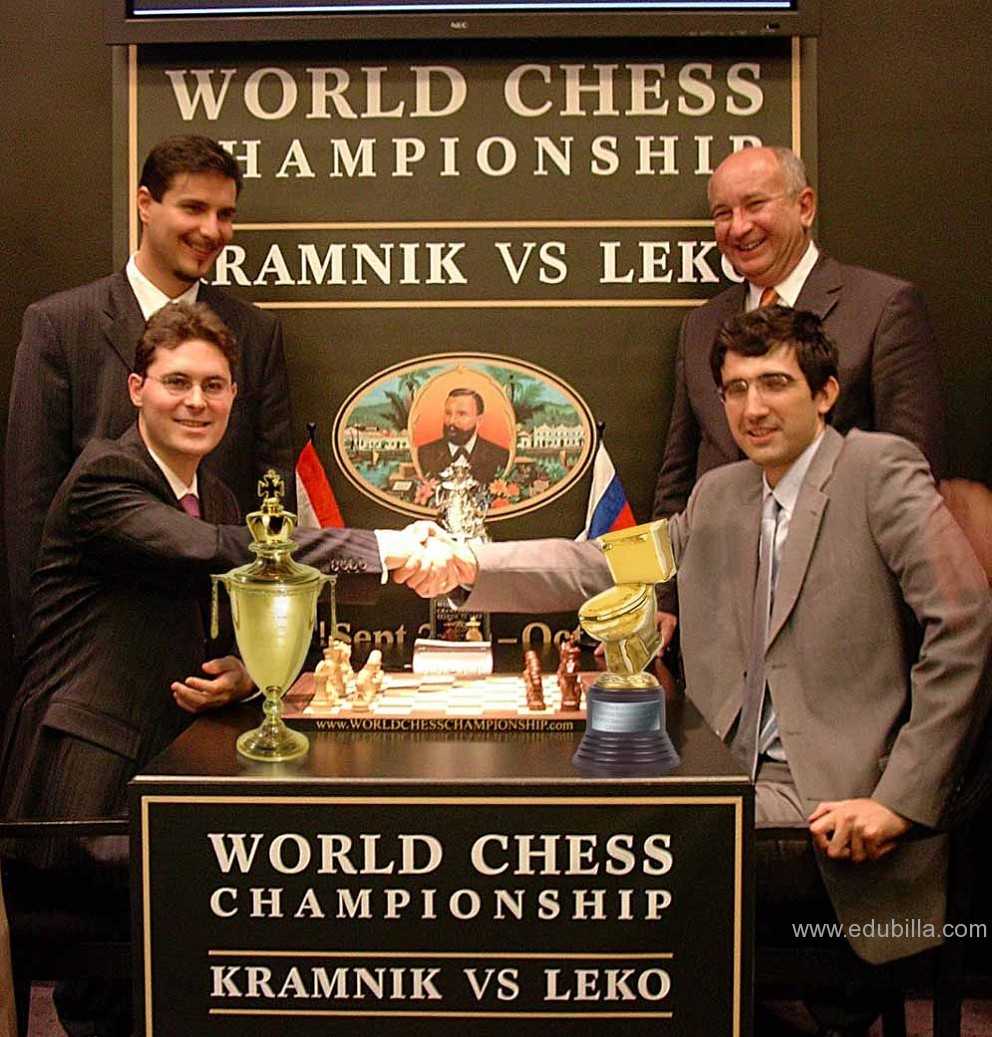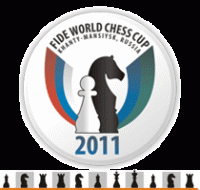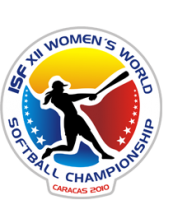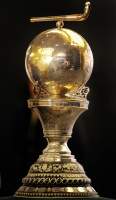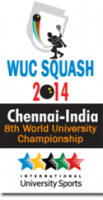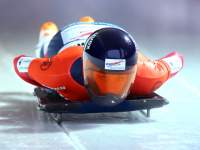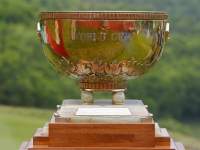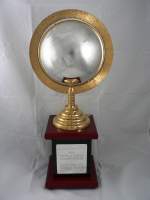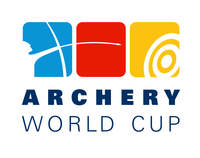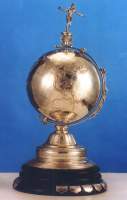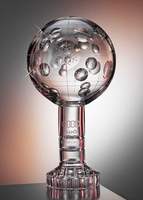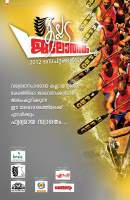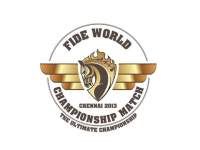
World Chess Championship
History Of World Chess Championship
The World Chess Championship (sometimes abbreviated as WCC) is played to determine the World Champion in chess.
The official world championship is generally regarded to have begun in 1886, when the two leading players in Europe and the United States, Johann Zukertort and Wilhelm Steinitz respectively, played a match. From 1886 to 1946, the champion set the terms, requiring any challenger to raise a sizable stake and defeat the champion in a match in order to become the new world champion. From 1948 to 1993, the championship was administered by FIDE, the World Chess Federation. In 1993, the reigning champion (Garry Kasparov) broke away from FIDE, which led to the creation of the rival PCA championship. The titles were unified at the World Chess Championship 2006.
Timeline of WCC:
- 1840-The idea of a world champion goes back at least to 1840, when a columnist in Fraser's Magazine wrote, "To whom is destined the marshal's baton when La Bourdonnais throws it down, and what country will furnish his successor ... At present de La Bourdonnais, like Alexander the Great, is without heir, and there is room to fear the empire may be divided eventually under a number of petty kings."
- 1843-The Englishman Howard Staunton's match victory over another Frenchman, Pierre Charles Fournier de Saint-Amant, in 1843 is considered to have established him as the world's strongest player, with a letter quoted in The Times on 16 November 1843, but probably written before that, described the second Staunton vs Saint-Amant match, played in Paris in November–December 1843, as being for "the golden sceptre of Philidor."
- 1845-The concept of a world chess champion started to emerge in the first half of the 19th century, and the phrase "world champion" appeared in 1845.
- 1846-The first known proposal that a contest should be defined in advance as being for recognition as the world's best player was by Ludwig Bledow in a letter to von der Lasa, written in 1846
- 1850- In 1850 to 1851 the forthcoming 1851 London International Tournament was explicitly described as being for the world championship by three commentators: a letter from "a member of the Calcutta Chess Club" (dated 1 August 1850) and another from Captain Hugh Alexander Kennedy (dated October 1850) in the 1850 volume of the Chess Player's Chronicle; and the Liberty Weekly Tribune in Missouri (20 June 1851).
- 1851-The 1851 London tournament was won by the German Adolf Anderssen, establishing Anderssen as the leading player in the world.Anderssen has been described as the first modern chess master.However, there is no evidence that this victory led to his being widely acclaimed at the time as the world champion, although in 1893 Henry Bird retrospectively awarded the title to Anderssen for his victory.
- 1866-Wilhelm Steinitz narrowly defeated Anderssen in an 1866 match, which some commentators consider the first "official" world championship match.The match was not declared to be a world championship at the time, and it was only after Morphy's death in 1884 that such a match was declared, a testament to Morphy's dominance of the game (even though he had not played publicly for 25 years).
- 1883-In 1883, Johannes Zukertort won a major international tournament in London, ahead of nearly every leading player in the world, including Steinitz.
- 1886-The official world championship is generally regarded to have begun in 1886, when the two leading players in Europe and the United States, Johann Zukertort and Wilhelm Steinitz respectively, played a match.
- 1887-In 1887 the American Chess Congress started work on drawing up regulations for the future conduct of world championship contests. Steinitz supported this endeavor, as he thought he was becoming too old to remain world champion.
- 1894-Before 1948 world championship matches were financed by arrangements similar to those Emanuel Lasker described for his 1894 match with Wilhelm Steinitz: either the challenger or both players, with the assistance of financial backers, would contribute to a purse; about half would be distributed to the winner's backers, and the winner would receive the larger share of the remainder (the loser's backers got nothing).
- 1911-in 1911 Lasker and Rubinstein agreed in principle to a world championship match, but this was never played as Rubinstein could not raise the money;and Alekhine, Rubinstein and Nimzowitsch all challenged Capablanca in the early 1920s but only Alekhine could raise the US $10,000 Capablanca demanded and only in 1927.
- 1912-Further controversy arose when, in 1912, Lasker's terms for a proposed match with Akiba Rubinstein included a clause that, if Lasker should resign the title after a date had been set for the match, Rubinstein should become world champion (American Chess Bulletin, October 1913).
- 1914-Attempts to form an international chess federation were made at the time of the 1914 St. Petersburg, 1914 Mannheim and 1920 Gothenburg Tournaments.
- 1922-In 1922 world champion Capablanca proposed the "London Rules": the first player to win six games would win the match; playing sessions would be limited to 5 hours; the time limit would be 40 moves in 2½ hours; the champion must defend his title within one year of receiving a challenge from a recognized master; the champion would decide the date of the match; the champion was not obliged to accept a challenge for a purse of less than US $10,000 (worth about $349,000 in 2006 terms); 20% of the purse was to be paid to the title holder, and the remainder being divided, 60% going to the winner of the match, and 40% to the loser; the highest purse bid must be accepted. Alekhine, Bogoljubov, Maróczy, Réti, Rubinstein, Tartakower and Vidmar promptly signed them
- 1924-On 20 July 1924 the participants at the Paris tournament founded FIDE as a kind of players' union.
- 1925-FIDE's congresses in 1925 and 1926 expressed a desire to become involved in managing the world championship. FIDE was largely happy with the "London Rules", but claimed that the requirement for a purse of $10,000 was impracticable and called upon Capablanca to come to an agreement with the leading masters to revise the Rules.
- 1926-. In 1926 FIDE decided in principle to create a parallel title of "Champion of FIDE" and, in 1928, adopted the forthcoming 1928 Bogoljubow–Euwe match (won by Bogoljubow) as being for the "FIDE championship".
- 1929-Alekhine easily won two title matches against Efim Bogoljubov in 1929 and 1934.
- 1935-In 1935, Alekhine was unexpectedly defeated by the Dutch Max Euwe, an amateur player who worked as a mathematics teacher. Alekhine convincingly won a rematch in 1937. World War II temporarily prevented any further world title matches, and Alekhine remained world champion until his death in 1946.
- 1946-Before 1946 a new World Champion had won the title by defeating the former champion in a match. Alexander Alekhine's death created an interregnum that made the normal procedure impossible.
- 1948-Since Keres lost his first four games against Botvinnik in the 1948 World Championship Tournament, suspicions are sometimes raised that Keres was forced to "throw" games to allow Botvinnik to win the Championship.
- 1956-In 1956 FIDE introduced two apparently minor changes which Soviet grandmaster and chess official Yuri Averbakh alleged were instigated by the two Soviet representatives in FIDE, who were personal friends of reigning champion Mikhail Botvinnik.
- 1967-Fischer withdrew from the 1967 Sousse Interzonal tournament in the 1966–69 World Championship cycle, after leading with 8½ points from the first 10 games. His observance of the Worldwide Church of God's sabbath was honored by the organizers, but deprived Fischer of several rest days, which led to a scheduling dispute.
- 1970's-Karpov dominated the 1970s and early 1980s with an incredible string of tournament successes. He convincingly demonstrated that he was the strongest player in the world (save Fischer) by defending his title twice against ex-Soviet Viktor Korchnoi, first in Baguio City in 1978 (6–5 with 21 draws) then in Meran in 1981 (6–2, with 10 draws). His "boa constrictor" style frustrated opponents, often causing them to lash out and err. This allowed him to bring the full force of his Botvinnik-learned dry technique (both Karpov and Kasparov were students at Botvinnik's school) against them, grinding his way to victory.
- 1993-In 1993, Kasparov and challenger Nigel Short complained of corruption and a lack of professionalism within FIDE and split from FIDE to set up the Professional Chess Association (PCA), under whose auspices they held their match.
- 2006-The FIDE World Chess Championship 2006 reunification match between Topalov and Kramnik was held in late 2006. After much controversy, it was won by Kramnik. Kramnik thus became the first unified and undisputed World Chess Champion since Kasparov split from FIDE to form the PCA in 1993.
- 2006-The FIDE World Chess Championship 2006 reunification match between Topalov and Kramnik was held in late 2006. After much controversy, it was won by Kramnik. Kramnik thus became the first unified and undisputed World Chess Champion since Kasparov split from FIDE to form the PCA in 1993.
- 2007-Kramnik played to defend his title at the World Chess Championship 2007 in Mexico. This was an 8-player double round robin tournament, the same format as was used for the FIDE World Chess Championship 2005. This tournament was won by Viswanathan Anand, thus making him the World Chess Champion.
- 2013-Anand lost his title in November 2013 in Chennai, India, to world No. 1 Magnus Carlsen, winner of the 2013 Candidates Tournament, by a score of 3.5–6.5. Carlsen successfully defended his title against Anand in Sochi in November 2014, with a score of 6.5–4.5.
World Chess Championship Archieve
Men's World Champions:
- Wilhelm Steinitz1886–1894
- Emanuel Lasker1894–1921
- José Raúl Capablanca1921–1927
- Alexander Alekhine1927–1935
- Max Euwe1935–1937
- Mikhail Botvinnik1948–1957,1958–1960,1961–1963
- Vasily Smyslov1957–1958
- Mikhail Tal1960–1961
- Tigran Petrosian1963–1969
- Boris Spassky1969–1972
- Robert J. Fischer1972–1975
- Anatoly Karpov1975–1985
- Garry Kasparov1985–1993
- Anatoly Karpov1993–1999
- Alexander Khalifman1999–2000
- Viswanathan Anand2000–2002
- Ruslan Ponomariov2002–2004
- Rustam Kasimdzhanov2004–2005
- Veselin Topalov2005–2006
- Vladimir Kramnik2006–2007
- Viswanathan Anand2007–2013
- Magnus Carlsen2013–present
Women's World Champions
- Vera Menchik1927–1944
- Lyudmila Rudenko1950–1953
- Elisabeth Bykova1953–1956
- Olga Rubtsova1956–1958
- Elisabeth Bykova1958–1962
- Nona Gaprindashvili1962–1978
- Maia Chiburdanidze1978–1991
- Xie Jun1991–1996
- Susan Polgar1996–1999
- Xie Jun1999–2001
- Zhu Chen2001–2004
- Antoaneta Stefanova2004–2006
- Xu Yuhua2006–2008
- Alexandra Kosteniuk2008–2010
- Yifan Hou2010–2012
- Anna Ushenina2012–2013
- Yifan Hou2013–2015
- Mariya Muzychuk2015
Most Popular Trophies
